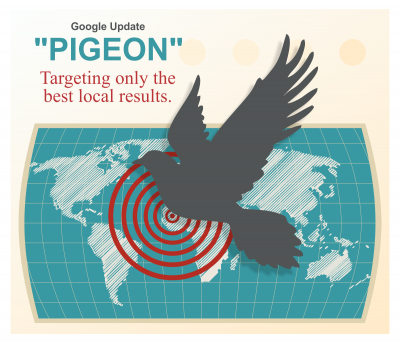Google Search Engine Update
Google Pigeon 3.0
Pandas, Penguins, Hummingbirds….and Now Pigeons?!?
Google’s at it again. Their “Virtual Zoo” continues to expand. It now includes Pigeons. Google continues to roll out new algorithms to better improve their users’ experience by providing the best results for their search queries.
Each of the updates focuses on different aspects to provide better, more relevant search results.
Panda (February, 2011): High quality vs. poor quality content.
Penguin (April, 2012): Earned links vs. link manipulation.
Hummingbird (Sept., 2013): Long-tail queries vs. individual search terms.
Pigeon: ???
The Pigeon update was launched on July 24, 2014. Since Google said they had no internal name for the update, Search Engine Journal decided to name it “Pigeon” (http://searchengineland.com/library/google/google-pigeon-update) after the bird that tends to fly back home because this latest update zeroes in on local results for local products, goods, and services.
Pigeon (July, 2014): Local directories vs. local, brick-and-mortar listings.
If you are a brick-and-mortar business, you need to pay attention. You may have already noticed that your website has dropped in rankings in favor of local directories such as Yelp, Yellowpages, Superpages, Yellowbook, Insiderpages, Smartpages, Manta, Urbanspoon, TripAdvisor, and OpenTable. Matt McGee, editor of Search Engine Journal, summed up his article, “Google’s Pigeon Update Solves Yelp Problem, Boosts Local Directories”, with this warning: “For those businesses and websites, local search has just gotten a lot more difficult.” http://searchengineland.com/googles-pigeon-update-solves-yelp-problem-boosts-local-directories-197949
So, if you are a local, brick-and-mortar business, what, if anything, can you do to rank your local listing?
Though it may be “difficult”, it’s not impossible. The #1 method is to improve, and keep on improving, your content. Content is still king.
What else can you do?
- Claim and optimize your “Google My Business” listing. Use all of the tools that Google gives you.
- Make sure your business and all relevant information is listed correctly on all of the popular local search directories for your industry in your area. This enables your potential customers and clients to find your website.
- Connect your social media account to your directory listings whenever possible.
- Since no changes have been noticed with respect to local carousel results, take advantage of this by complementing your business profile with high quality, attractive photos.
- Work on collecting positive reviews from satisfied customers.
- Research your competition to determine what they may have that you lack by particularly focusing on back links and content.
- Continue to use white hat SEO methods since all of Google’s updates are geared towards rewarding the basic white hat SEO techniques and weeding out or penalizing the black hat.
***Create the best user experience possible by making your site the best it can be for them.
***Good Content. Great Content. Amazing content.
As much as you might think that Google’s updates are “for the birds”, you need to pay attention since these updates could determine whether or not your website is “for the birds”.

